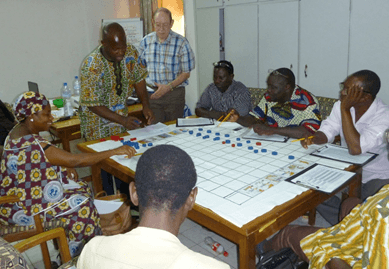I did it! I’ve passed my first ‘crash test’ in Burkina Faso. And what a test it was!
I was examined by 19 livestock specialists from three different organisations simultaneously. They were from a livestock development program (the Azawak Pastoral Resources program, co-financed by the Luxembourg Development Cooperation), the 9 decentralised services of Burkina Faso’s Ministry of Animal and Fishing Resources, and the central management of the same ministry (Direction Générale des Etudes et des Statistiques Sectorielles). What’s more, the test involved two different climate zones (Sahelian and Sudanese) and all three species of ruminant: cattle, sheep and goats.
These three organisations examined all my different tools and gave me an excellent evaluation: I scored 88%! This (very encouraging) score was based on the quality of my tools (training modules, guide to running surveys, ‘game’ elements and, of course software), but also on other aspects such as how reliable and user-friendly I am. Thus, from 81 farmers who participated in these tests, 91% of the surveys were approved following the quality control tests. The farmers very quickly mastered the ‘rules of the game’ and recognised the benefit these surveys would have to their farming practices. Many of them showed real enthusiasm for this type of technology, because of its playful and instructive nature.
Regarding my usefulness in relation to the specific aims and expectations of each of the three organisations testing me, they gave me… full marks! 100%!
Still, I need to stay humble, and not count all my chickens before they’re hatched… I still have 3 more tests to sit: two in Niger and one in East Africa.

You can read the original blog post on the website of the Humanitarian Innovation Fund. This project is supported by the Humanitarian Innovation Fund, a programme managed by ELRHA. The Humanitarian Innovation Fund (HIF) is a unique non-profit grant making facility supporting organisations and individuals to identify, nurture and share innovative and scalable solutions to the challenges facing effective humanitarian assistance. Visit their website for more information.
